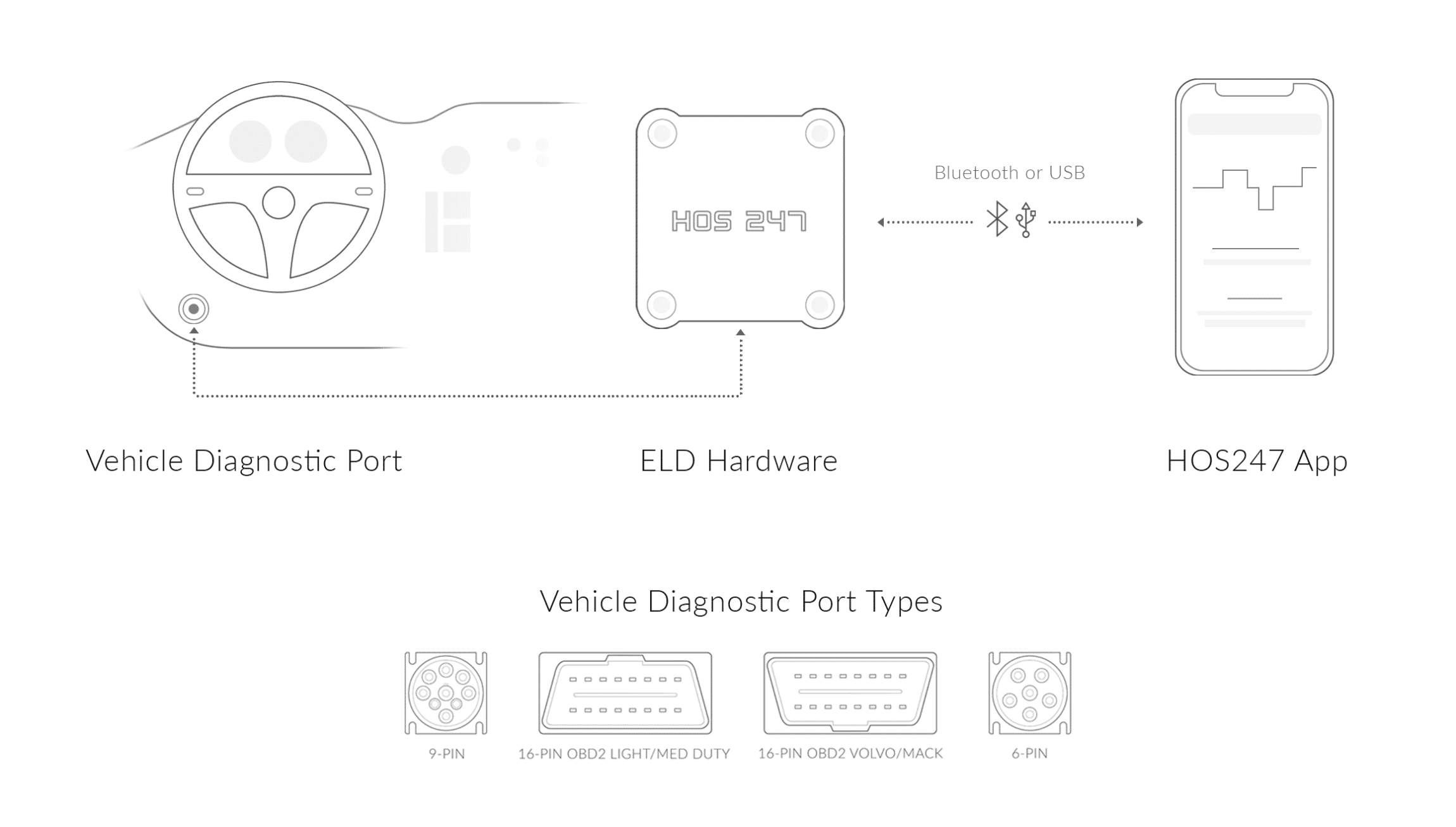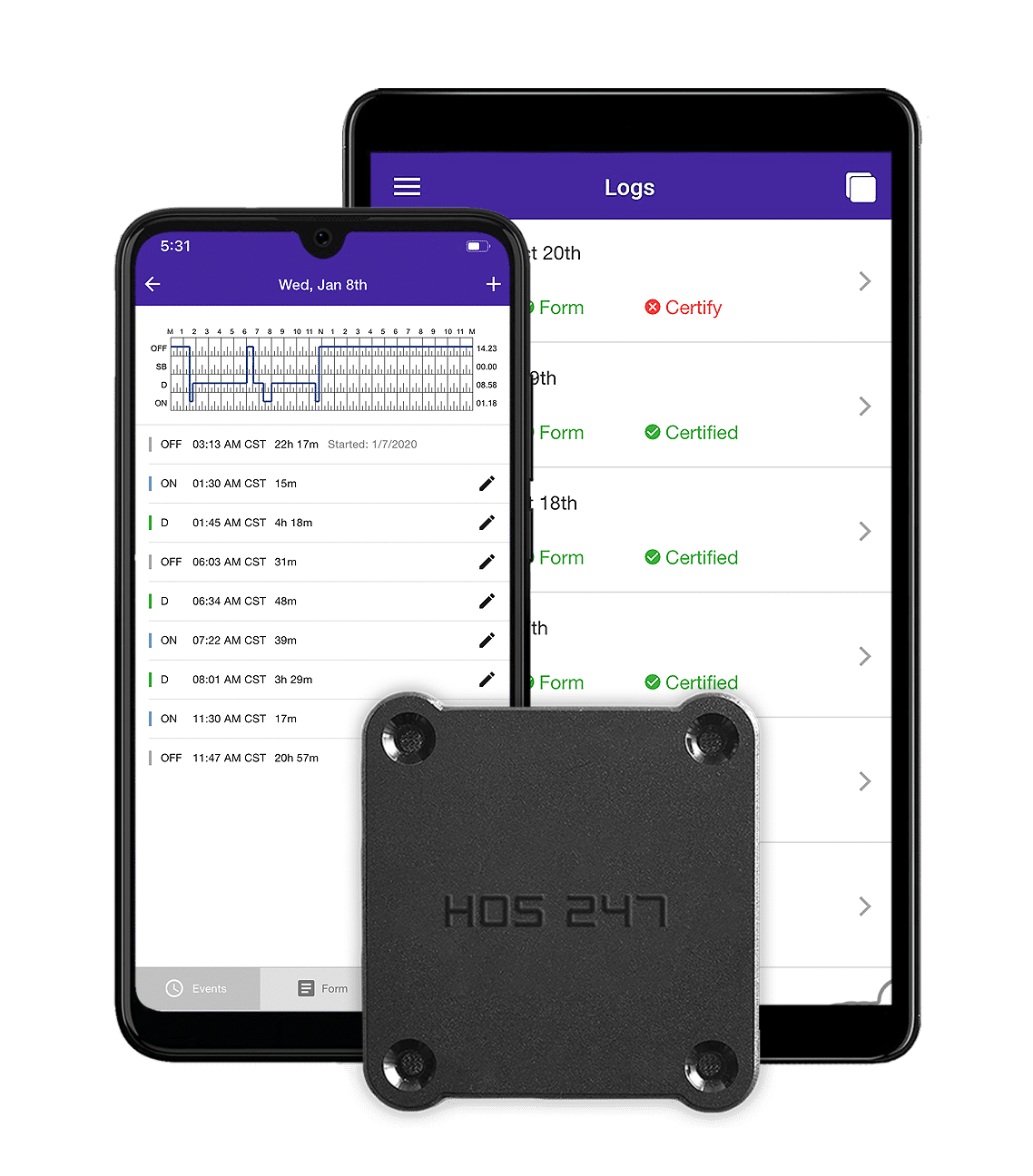Finding a guaranteed compliant DOT ELD may be challenging in the US. Manufacturers of electronic logging devices certify their own products based on the technical requirements established by FMCSA. Unfortunately, even elogs officially registered in the DOT ELD list may present issues, compromising carriers’ compliance with federal regulations.
Non-compliant devices can significantly affect operational workflows. In the worst-case scenario, a motor carrier risks facing thousands of dollars in fines, drivers being put out of service, and scoring extra CSA points that may lead to greater risk of audits and roadside inspections. However, even if the consequences are not as drastic, unreliable devices can considerably slow down the efficiency and productivity of operations. In this article, we will go over the main compliance requirements and share tips on choosing a dependable DOT ELD for your trucking business.
How Does an ELD Work?
According to the elog mandate, to achieve DOT compliance ELD devices must synchronize with the vehicle system by connecting to the engine control module. This way, they record driving hours automatically anytime the vehicle moves at five mph or faster. Logbooks are programmed according to interstate and intrastate HOS rules to calculate limits for drivers and notify them of potential violations.
All collected data is available through the app on the driver’s tablet or smartphone for them to manage and display the information for officers during roadside inspections. At the same time, fleet managers can access the data through a web portal and can analyze these valuable metrics to improve operational efficiency.

Do you have any questions? Talk to ELD Advisor: 650-405-3372 or Request Callback
Checklist of FMCSA Requirements to Verify DOT ELD Compliance
The first step when choosing a solution is to check the DOT ELD list of electronic logbooks on the FMCSA’s official website. Devices registered with the Federal Motor Carrier Safety Administration are expected to meet mandatory technical requirements since their manufacturers certify that they have run all pertinent tests. We made a checklist of these specifications to help motor carriers verify that their potential provider meets federal regulations:
- Portability. Potable ELDs must be mounted in a fixed position and visible to the driver when operating the vehicle.
- In-cabin documents. The driver’s information packet must include instructions on how to operate the electronic logging system, how to transfer RODS to officers, what to do in case of malfunction, and blank paper logs for at least eight days.
- Account types. Drivers and managers must have separate accounts with different access levels—even if they are the same person, as in the case of owner-operators. The DOT ELD rule prohibits multiple driver accounts to be created for one driver and for drivers to have administrative rights to create accounts.
- Available duty statuses. Personal Use, Yard Move, and None-Default statuses must be authorized by motor carriers for each driver. Carriers must also be able to configure a driver account as exempt.
- Immediate power on. The device must be fully functional a minute after the vehicle’s engine has been turned on.
- ELD function. A device should receive data from the engine control module through methods such as Bluetooth or hardwiring to the J1939 plug.
- Date and time. Electronic logbooks must record and convert time and date automatically in the time standart ar the driver’s home terminal.
- Vehicle geographic location information. A device must update position data for each change of duty status. An ELD is expected to acquire a valid position measurement at least once every 5 miles, with the location accuracy being approximately within a 1-mile radius during on-duty driving periods. It cannot be replaced by GPS as the latter can’t be integrally synchronized with a vehicle’s engine and capture the data crucial for compliance with DOT ELD regulations.
- Driver’s entry of location information. Electronic logbooks must allow driver access to a vehicle location in text format if the system fails to acquire a valid position measurement.
- Engine hours. The device must register when the vehicle’s engine is powered on and shut down.
- Vehicle miles. The system must provide information about the distance traveled while operating a vehicle in each duty status.
- User identification data. If an operator doesn’t log into the ELD, the electronic logbook must record accumulated driving time in accordance with an ELD defaults under the unidentified driver profile until the records are assigned to the correct owner.
- Vehicle information. The vehicle’s identification number must be automatically obtained from the engine ECM and recorded via the vehicle databus.
- Driver’s annotation of record. This is a note related to a record, update, or edit that drivers input to the ELD to explain a particular situation. These annotations may indicate the beginning and end of a driver’s shift, yard moves, and adverse driving conditions.
- Edit limitations. An electronic logbook must not allow automatically recorded driving time to be shortened or the ELD username to be edited or reassigned.
- Driver certification. A device must record the moment the operator certifies or re-certifies (if there were any edits made by them or the carrier’s staff) the authenticity of the driver’s records for 24 hours. FMCSA recommends that drivers first certify their RODS before logging off the ELDs.
- Automatic setting of duty status. A logbook must automatically record driving time when the vehicle is in motion by setting duty status to Driving. When the vehicle is not in motion for five minutes after the vehicle has stopped, the system must send the driver an alert to change their duty status. In case the driver ignores the ELD prompt, the system should automatically switch the duty status to On-Duty, Not Driving.
- Special driving categories. Drivers must be able to log the beginning and end of a period when they are using the vehicle for authorized personal use or for performing yard moves, if these categories have been previously authorized by the carrier.
- Roadside inspections. To meet roadside electronic data transfer requirements, electronic logging devices must be able to either print or display an ELD record for the current 24-hour period and the previous seven consecutive days. The collected data can be transferred via email, Bluetooth or USB2 to the safety officer.
- Malfunctioning devices. If an ELD malfunctions, the motor carrier has eight days to repair or replace the device
Characteristics of a Quality DOT ELD
However, compliance is not the only characteristic of a quality ELD. Reliable electronic logbooks can smoothen internal operations, boost overall productivity, reduce costs and save time, reducing paperwork and administrative burdens. After reviewing the technical aspects of DOT ELD regulations, it’s time to check the characteristics that make elogs easy to implement and operate:
- Intuitive interface. Navigating complex software can be discouraging. Elogs must be simple and straightforward, so operators can focus on driving instead of being frustrated while managing their HOS reports. Most providers offer demos or a trial period so you can make sure the system is appropriate for your staff.
- Simple installation. Look for an ELD that your drivers can easily set up. A device that requires special installation can be a red flag, as the process may lead to downtime and extra expenses.
- Efficient customer service. Even if a device is easy to install and the app is intuitive, truckers may have doubts related to troubleshooting and everyday use of the system. Accessible technical support is crucial for truckers to avoid compliance issues and keep RODS correctly. Make sure that you can get through to your provider’s support line easily and that their reps are knowledgeable and helpful.
- Compatible hardware. This characteristic is of significant importance if you are an owner of a fleet that contains vehicles of different sizes. A universal solution will cut costs and reduce the administrative burden caused by the usage of multiple systems.
- Transparency in prices. Seemingly cheap solutions can turn out to be more expensive due to additional costs for training, activation, dedicated tablets, etc. Ask about any extra fees before purchasing your device and make sure your drivers can use their own devices to display and manage RODS information.
Online reviews on Google Play or the Apple App Store can be useful in determining if a potential provider is reliable. Fellow truckers are a valuable source of information and their experience with an elog system can save you time and money. HOS247 is top-rated by drivers and fleet managers thanks to our reliable service and efficient support.

Do you have any questions? Talk to ELD Advisor: 650-405-3372 or Request Callback
HOS247 Is a Leading ELD Service Provider
In HOS247, we understand the importance of a customer-centered approach. Focused on our clients’ needs, HOS247 offers a reliable FMCSA-registered ELD solution that doesn’t require special installation, has driver-friendly software and an intuitive fleet manager portal that help ensure a maximum level of compliance with the DOT ELD regulations with minimal effort. HOS247 customer-care policies include:
- Top-rated technical support. Our customers appreciate the HOS247 technical support team for their accessibility, efficiency, and knowledgeability. Our team of professionals provides excellent service from Monday through Sunday in multiple languages, including Spanish.
- Call-back policy. Because we value our client’s time, we will call them back immediately if the call drops. This policy ensures truckers do not have to explain their issue more than once and helps solve issues faster.
- One-year warranty. We are confident in the quality of our devices: HOS247 ELDs are made of durable materials and enable a stable Bluetooth connection at all times. If there are any issues during the first year, we offer a free hardware replacement.
- No-contract policy. Unlike other providers that lock up their clients in long-term contracts, HOS247 offers a flexible system of monthly or yearly subscriptions, giving customers the freedom to scale their plans up or down according to their needs or cancel them if they so decide.
- Two-week trial. We encourage our clients to try our two-week trial to familiarize themselves with our solution before subscribing to a plan, so they can be sure that our system suits the needs of their business.

I’ve co-founded, built and managed several transportation-related businesses. Now, I’m a founder and CEO of HOS247 – an AI Transportation Platform for trucking companies, freight brokers and other logistics operations. We are transitioning old-style operations to technology-advanced logistics entities and help them to grow their businesses. ELDs (electronic logging devices), fleet tracking and management 2.0 combined with AI-powered dispatch tools.












If you are a fleet owner, you know the struggle of managing a large number of vehicles, ensuring timely deliveries, and complying with industry regulations. These challenges can be even more daunting when you consider the complexities of the modern

In today’s highly competitive business environment, fleet managers face numerous challenges in ensuring the efficiency, profitability, and compliance of their operations. From managing driver hours and vehicle maintenance to optimizing routes and controlling fuel costs, the tasks associated with running

In today’s highly competitive trucking industry, fleet managers face numerous challenges in ensuring the efficiency, safety, and profitability of their operations. One of the most effective tools for addressing these challenges is GPS fleet tracking technology. By providing real-time visibility